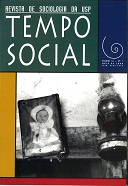Walter Benjamin e Paris: individualidade e trabalho intelectual
DOI:
https://doi.org/10.1590/S0103-20702000000100002Keywords:
Walter Benjamin, individual, city, flânerie, social sciences, modernityAbstract
This paper is an interpretation of Walter Benjamins Paris, Capital of the 19th Century. Based on the notes Benjamin made on several books he read, mainly during his research at the Bibliotèque Nationale, the author discusses the notion of the individual linking it to two themes. First, to the emergence of the flâneur as a translation of the spirit of mobility which starts with modernity. The discussion on the notion of space, especially where it concerns Paris, is essential for this analysis. The flâneur is seen as an uprooted individual who moves around the remodelled urban space. Second, to the proximity between the act of flânerie and that of intellectual work. Taking flânerie to be intellectual activity, the author shows how the themes of the distancing and the construction of the object are relevant, both to the detective-flâneur and to the reflection in social sciences.Downloads
References
ADORNO. (1973) Experiencias cientificas y Estados Unidos. In: Consignas.Buenos Aires, Amorrortu.
AGULHON, Maurice (org.). (1983) Histoire de la France urbaine. Paris, Seuil.
AGAMBEN, Giorgio. (1986) Cronologia dell’opera e notizie sul testo. In: BENJAMIN, Walter. Parigi capitale del XIX secolo, Torino, Einaudi.
ARIÈS, Philippe. (1971) Histoire des populations françaises. Paris, Seuil.
BENJAMIN, Walter. (1986) Parigi capitale del XIX secolo. Torino, Einaudi.
BERGERON, Louis (1983) Les voies du grand commerce. In: LEQUIN, Yves (org.). Histoire des Français XIXe-XXe siècles. Paris, Armand Colin.
BOURDIEU, P., PASSERON, J. C. & CHAMBOREDON, J. C. (1973) Le métier de sociologue. Paris, Mouton.
BOURDIEU, Pierre. (1996) As regras da arte. São Paulo, Companhia das Letras.
CHARTIER, Roger. (1978) Les deux Frances: histoire d’une geographie. Cahiers d’Histoire, tomo 23.
CHEVALIER, Louis. (1984) Classe laborieuses et classes dangereuses à Paris pendant la première moitié du XIXe siècle. Paris, Hachette.
DATZ, Pierre. (1894) Histoire de la publicité. Paris, J. Rothschild.
D’AVENEL, Georges. (1896) Les mécanismes de la vie moderne. Paris, Colin (tomos I, II, IV), 1896, 1897, 1902.
FARAUT, François. (1983) La confection masculine à Paris depuis le 19ème siècle: le cas de la Belle Jardinière. Paris. Tese (Doutorado). École des Hautes Études en Sciences Sociales.
FIGUIER, Louis. (1989) La photographie au salon de 1859. In: ROUILLÉ, A. (org.). La photographie en France. Paris, Macula.
FOURNEL, Victor. (1858) Ce qu’on voit dans les rues de Paris. Paris, Adolphe Delahays.
GALABRUN, A. Pardaillé. (1983) Les déplacements de parisiens dans la ville au XVIe et XVIIe siècles. Histoire, economie et société, nº 2.
GILLE, Bertrand. (1978) Histoire des techniques. Paris, Gallimard.
JARRY, Paul. (1948) Les magasins de nouveautés: histoire retrospective et anédoctique. Paris, A. Barry.
LAZARSFELD, Paul. (1969) An episode in the history of social research. In: FLEMING, D. & BAILYN, B. (orgs.). The intelectual migration: Europe and America, 1930-1960. Cambridge, Harvard University Press.
LE BON, Gustave. (1980) Psicologia das multidões. Rio de Janeiro, Delraux.
LEVASSEUR, E. (1912) Histoire du commerce de la France. Paris, Arthur Rousseu.
MESSAC, Régis. (1972) Le dectetive novel et l’influence de la pensée scientifique. Genève, Slatkine Reprints (primeira edição, 1929).
MILLER, Michael. (1987) Au Bon Marché (1869-1920): la consommation apprivoisé. Paris, Colin.
MILLS, Wright. (1972) A imaginação sociológica. Rio de Janeiro, Zahar.
MORSEL, Henri. (1983) Les grands rythmes économiques du XIX siècle. In: LEQUIN, Yves (org.). Histoire des Français XIXe-XXe siècles. Paris, Armand Colin.
NADAR. (1900) Quand j’étais photographe. Paris, Flammarion.
NISBET, Robert. (1979) La sociologia como forma de arte. Madri, EspasaCalpe.
ORTIZ, Renato. (1989) Durkheim: arquiteto e herói fundador. Revista Brasileira de Ciências Sociais, São Paulo, 4(11), outubro 1989.
ORTIZ, Renato. (1991) Cultura e modernidade. São Paulo, Brasiliense.
ORY, P. (1982) Les expositions universelles à Paris. Paris, Ramsay.
OSTER, Daniel & GOULEMOT, Jean. (1989) La vie parisiente: anthologie des moeurs du XIXe Siècle. Paris, Sand/Conti.
OUSBY, Ian. (1997) The crime and mystery book. Hong Kong, Thames and Hudson.
POLLACK, Michael. (1979) Paul Lazarsfeld fondateur d’une multinationale scientifique. Actes de la Recherche en Sciences Sociales, (25), janeiro.
PRONTEAU, Jeanne. (1966) Les numérotages des maisons de Paris du XVème siècle à nos jours. Paris, Imprimerie Municipale.
ROUANET, Sergio Paulo. (1984) Introdução a Walter Benjamin. In: CHAUÍ, Marilena de Souza (org.). Origem do drama barroco alemão. São Paulo, Brasiliense.
SARTRE, Jean Paul. (1972) L’idiot de la famille. Paris, Gallimard.
TARDE, Gabriel. (1989) L’opinion et la foule. Paris, PUF.
TIEDMANN, Rolf. (1989) Introdução. In: BENJAMIN, Walter. Paris capitale du XIXe siècle. Paris, Éditions du Cerf.
WILLIAMS, Raymond. (1958) Culture and society. New York, Columbia University Press.
Downloads
Published
Issue
Section
License
Copyright (c) 2015 Tempo Social

This work is licensed under a Creative Commons Attribution-NonCommercial 4.0 International License.


